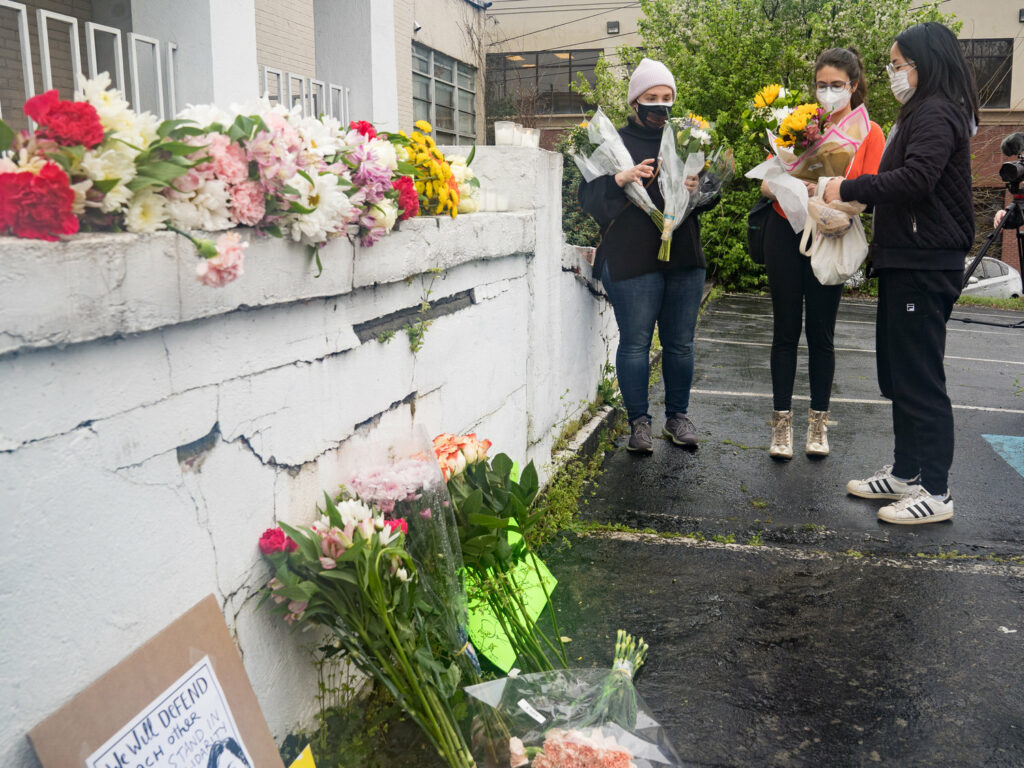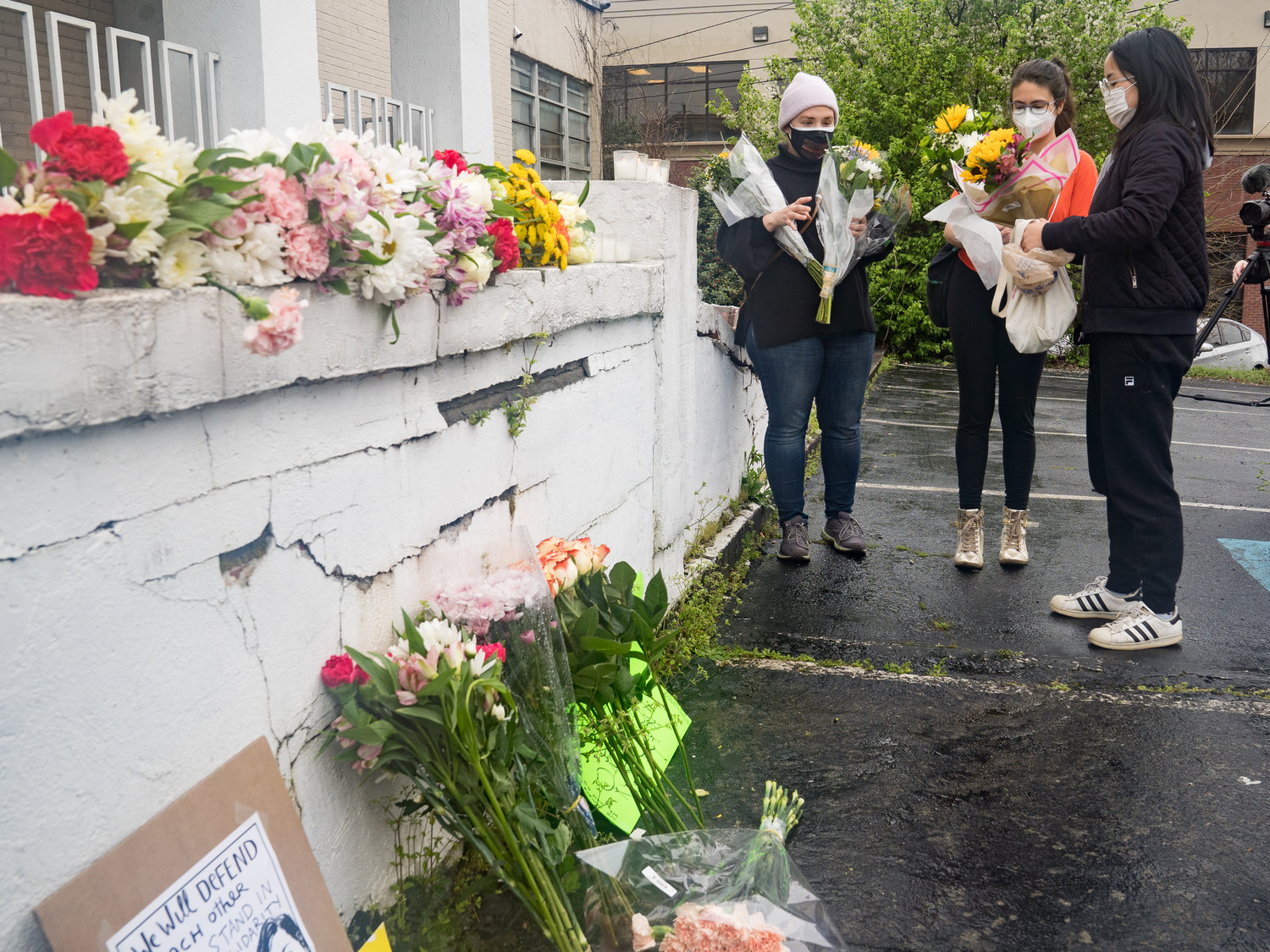
Outside the location of one of the shootings, mourners bring flowers and pay their respects.
Attack on Asian-owned businesses exemplifies white male privilege
Despite the messages of freedom, liberty and modernity many Americans often feel define their country, the racially motivated shootings in Atlanta over spring break exemplify the often archaic and bigoted reality of America.
On Tuesday, March 16th, the following eight people lost their lives at the hands of a white male gunman in Atlanta-area spas: Xiaojie Tan, Delaina Yaun, Paul Andres Michels, Daoyou Feng, Yong Ae Yue, Hyun Jung Grant, Soon Chung Park and Suncha Kim.
Their deaths weren’t just the result of a man having a ‘bad day,’ but of a society that incubates, tolerates and often promotes racism and misogyny. Their deaths were only possible due to laws that prioritize the access to deadly weapons over the life, liberty and happiness of those citizens whose lives they take away.
The shooter, Robert Aaron Long, said he wanted to remove the sexual temptation he felt these businesses presented. News sources and local officers alike used this reasoning to place the burden of responsibility on the victims; like women were somehow responsible for their own sexualization and Asian citizens were responsible for their own fetishization.
It’s unclear at this time if Long will be charged for a hate crime, but when seven of the eight victims were women and six of the eight victims were of Asian descent, the misogyny and racism inherent in this act shouldn’t be of question.
Racially motivated attacks on Asian Americans are at their highest rates in recent history, there have been two highly publicized mass shootings within the last week alone. While it is tempting with the roll-out of the vaccine to happily anticipate the return to normal, we can’t wait any longer to acknowledge that systemic racism and wide-spread gun violence should never be normal.
The anti-Asian sentiment is not new in the U.S. In the past, such bigotry led to laws restricting Chinese and Japanese immigration, and even the internment of Japanese Americans in 1942 which led to families losing homes and businesses. Yet, even with this country’s rich history of racism against Asian citizens, many people can’t seem to comprehend just how bad the state of things are today.
Though the increase in Asian-American hate crimes in the U.S. has been incredibly high since the start of the pandemic, this racially motivated attack really shined a light on how Asian voices need to be more centered when it comes to discussions of race and diversity in America.
A study from the Center for the Study of Hate and Extremism at California State University released earlier this month showed that hate crimes against Asian Americans spiked 149 percent from 2019 to 2020, despite a 7 percent decrease in hate crimes overall.
Another group, called Stop AAPI (Asian American and Pacific Islander) Hate, found almost 3,800 hateful incidents against Asian Americans in the first year of the pandemic.
These attacks have been spurred on by incendiary comments about the source of the pandemic. Former President Donald Trump repeatedly referred to the virus as the “China virus” and the “Kung Flu,” passing the blame for the handling of the virus in the U.S. onto anyone of Asian descent, regardless of whether or not they were Americans.
In fact, he used these terms on March 16th in an interview with Fox News, though it’s unclear if he was aware of the shootings in Atlanta.
Contrary to the officer who reported on Long’s actions, he wasn’t just “having a bad day” when he bought a gun, then shot and murdered eight people. Long’s actions weren’t the result of feeling a little off, instead, he was an example of what happens when inflammatory words against Asians and women are turned into action.
The fact that Long was brought into police custody unharmed is a shining example of white privilege and the reasoning behind his attack, removing the temptation of women, is an example of male privilege.
This past week has been a time for Asian Americans to grieve, address the racism they have encountered and ask others to stand as allies.
Pigeon-holed into a role as a model minority so they are chastised when they don’t match a fictionalized caricature, villainized when they are successful, often presented in offensive and stereotyped ways in the media, forced to Americanize their names, clothing, culture—this country needs to do better by Asian Americans.
And of course, the problem isn’t just racism alone, it’s the way the damage of racism is amplified when it takes less time to get a gun than it does to even register to vote.
As of March 22nd, there have been 109 mass shootings in the U.S. in 2021. We’re averaging more than one mass shooting a day. CNN found that the U.S. ranks 23rd out of all countries for gun-related deaths, far more than other countries of comparable wealth and size. We have more gun-related deaths per capita than any country in Europe or the Middle East.
The Small Arms Survey, an international survey out of Switzerland, found that Americans own nearly half—46 percent—of all estimated civilian-owned guns in the world. Per capita, Americans own more guns than any other country in the world, more than doubling the amount in the next highest country (in the U.S. there are 120.8 guns for every 100 citizens, Yemen is second with 52.8 guns for every 100 citizens).
Correlation does not always mean causation, but in this case, it does. The U.S. has the most guns and also the most shootings. There are more public mass shootings in the U.S. than in any other country in the world. We’re not first in education, health care, wealth, happiness or even freedom (2.3 million people are incarcerated in the U.S.), but we are first in public gun violence.
Looking at the demographics of shooters, they are often young, male and white. Critics argue that the percentage of white male shooters is equivalent to the makeup of the U.S. population.
In all fairness, roughly 70 percent of shooters are white and roughly 70 percent of the U.S. population is white; however, women represent less than one percent of mass shooters. If the demographics of mass shooters are meant to match the U.S. population, then half of all shooters should be female and roughly 30 percent should be white males, but of course, we know this is not the case.
We have to recognize whiteness and masculinity are a dangerous combination. Long somehow felt entitled to take the lives of these eight individuals because he felt spurned by businesses he saw as tempting him.
Sociologist Michael Kimmel calls this phenomenon ‘aggrieved entitlement’; a feeling of frustration that results when a status of privilege, namely whiteness and masculinity, that is meant to provide certain rewards don’t deliver. Many white men complain that they don’t have white or male privilege, from their point of view things don’t look too good.
If you’re white or male, you may feel this way too. You struggle, you run into hard times, you don’t feel like you’re handed any opportunities. The important thing to remember is that you’ve never had to struggle as a result of either your gender, race or a combination of both. Not to mention that many white men do feel like they’re entitled to the American dream and feel they’ve been cheated if they never quite get there.
Long too seemed to feel this, sexually frustrated, something a white man should never have to feel, he took out his anger in the most visceral and final way possible. As Kimmel has stated, “We need a conversation about gun control laws. And far more sweeping—and necessary—is a national meditation on how our ideals of manhood became so entangled with violence.”
People love to say, “Guns don’t kill people, people kill people,” but we all know Long would not have been able to kill eight people in such a short amount of time if he didn’t have a gun, and in most other countries, he wouldn’t have had a gun.
Nations that have implemented restrictive gun laws don’t have people dying from mass gun violence the way the U.S. does. Take Australia for example, they had four mass shootings between 1987 and 1996 and they passed stricter gun laws. They’ve had 34 shooting-related homicides in the last 25 years, we had over 19,000 in 2020 alone.
A significant amount of time and a lot of relearning is going to be required if we hope to address the issues of racism and misogyny in this country. This week, today, we can start by listening to and supporting Asian Americans.
The question is how much longer are we willing to wait before we deal with the problem of gun violence in this country? Children shouldn’t have to prepare for school shooters. People working at their job, buying groceries, attending a movie, going to a nightclub or listening to a concert shouldn’t be at risk of losing their lives.
We have normalized gun violence. We have made guns a symbol of American patriotism, when, too often, they are used as a weapon of destruction. Responsible gun owners shouldn’t want guns in the hands of those who cannot handle them. Americans should not want this legacy of death.
